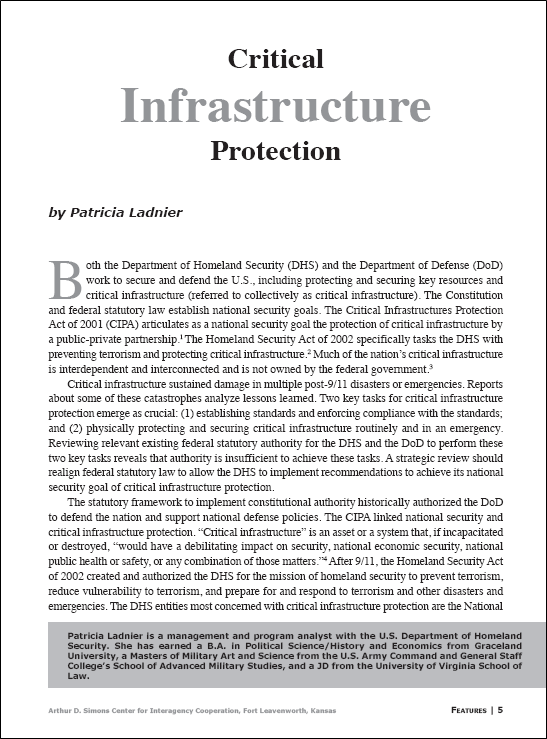Featured Article: Critical Infrastructure Protection
Featured article:
Critical Infrastructure Protection
by Patricia Ladnier
Both the Department of Homeland Security (DHS) and the Department of Defense (DoD) work to secure and defend the U.S., including protecting and securing key resources and critical infrastructure (referred to collectively as critical infrastructure). The Constitution and federal statutory law establish national security goals. The Critical Infrastructures Protection Act of 2001 (CIPA) articulates as a national security goal the protection of critical infrastructure by a public-private partnership. The Homeland Security Act of 2002 specifically tasks the DHS with preventing terrorism and protecting critical infrastructure. Much of the nation’s critical infrastructure is interdependent and interconnected and is not owned by the federal government.
Critical infrastructure sustained damage in multiple post-9/11 disasters or emergencies. Reports about some of these catastrophes analyze lessons learned. Two key tasks for critical infrastructure protection emerge as crucial: (1) establishing standards and enforcing compliance with the standards; and (2) physically protecting and securing critical infrastructure routinely and in an emergency. Reviewing relevant existing federal statutory authority for the DHS and the DoD to perform these two key tasks reveals that authority is insufficient to achieve these tasks. A strategic review should realign federal statutory law to allow the DHS to implement recommendations to achieve its national security goal of critical infrastructure protection…
Read the full article
Critical Infrastructure Protection PDF
Download the complete edition
IAJ 8-3 (2017) PDF
IAJ 8-3 (2017) ePub
Patricia Ladnier is a management and program analyst with the U.S. Department of Homeland Security. She has earned a B.A. in Political Science/History and Economics from Graceland University, a Masters of Military Art and Science from the U.S. Army Command and General Staff College’s School of Advanced Military Studies, and a JD from the University of Virginia School of Law.

Posted: August 16, 2017 by Simons Center
"*" indicates required fields


